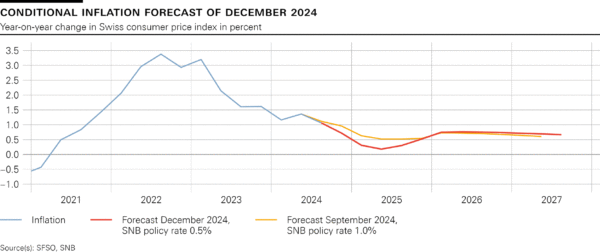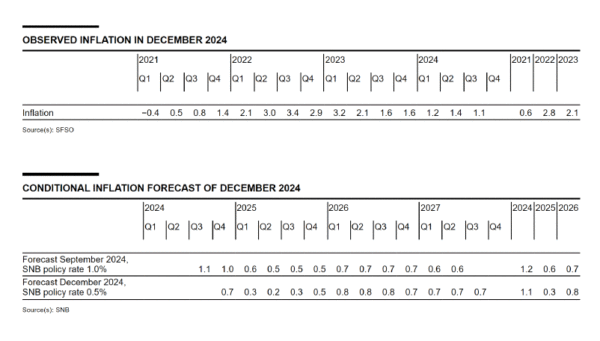The Swiss National Bank is lowering the SNB policy rate by 0.5 percentage points to 0.5%. The new policy rate applies from tomorrow, 13 December 2024. Banks’ sight deposits held at the SNB will be remunerated at the SNB policy rate up to a certain threshold, and at 0% above this threshold. The SNB also remains willing to be active in the foreign exchange market as necessary.
Underlying inflationary pressure has decreased again this quarter. The SNB’s easing of monetary policy today takes this development into account. The SNB will continue to monitor the situation closely, and will adjust its monetary policy if necessary to ensure inflation remains within the range consistent with price stability over the medium term.
Inflation in the period since the last monetary policy assessment has again been lower than expected. It decreased from 1.1% in August to 0.7% in November. Both goods and services contributed to this decline. Overall, inflation in Switzerland is still being driven mainly by domestic services.
In the shorter term, the new conditional inflation forecast is below that of September. This above all reflects the lower-than-expected inflation in the case of oil products and food. Thanks to the policy rate cut today, there is little change in the medium term. The new forecast is within the range of price stability over the entire forecast horizon (cf. chart). It puts average annual inflation at 1.1% for 2024, 0.3% for 2025 and 0.8% for 2026 (cf. table). The forecast is based on the assumption that the SNB policy rate is 0.5% over the entire forecast horizon. Without today’s rate cut, the conditional inflation forecast would have been lower.
Global economic growth was moderate in the third quarter of 2024. Recently, inflation in many countries was again close to central banks’ targets. However, core inflation remained elevated. In anticipation of a continued decline in inflation, various central banks cut their policy rates further this quarter.
Underlying inflationary pressure abroad is likely to carry on easing gradually over the next quarters. At the same time, the moderate pace of global growth should continue.
Uncertainty about the economic outlook has increased in recent months. In particular, the future course of economic policy in the US is still uncertain, and political uncertainty has also risen in Europe. In addition, geopolitical tensions could result in weaker development of global economic activity. Equally, it cannot be ruled out that inflation could remain higher than expected in some countries.
As anticipated, GDP growth in Switzerland was only modest in the third quarter of 2024. Growth in the services sector was again somewhat stronger, while value added in manufacturing declined. There was a further slight increase in unemployment, and employment growth was only subdued. The utilisation of overall production capacity was normal.
The SNB anticipates GDP growth of around 1% for the current year. Thanks also to the easing of monetary policy in recent quarters, growth should pick up somewhat next year, albeit only slightly due to the moderate global economic activity. The SNB currently expects growth of between 1% and 1.5% for 2025. In this environment, unemployment should continue to rise slightly, while the utilisation of production capacity is likely to decline somewhat.


